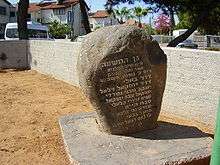1969 Baghdad hangings
On 27 January 1969, Iraqi authorities hanged 14 alleged spies (nine Jews, three Muslims and two Christians) for Israel in a public execution in Baghdad.[1]
Background
By 1969, Iraq's Jewish community had shrunk from more than 130,000 in 1948 to less than 3,000 due to mass emigration caused by anti-Jewish persecution and the establishment of the State of Israel.[1]
The lopsided defeat suffered by the Arab states, including Iraq, against Israel in the June 1967 Six-Day War further increased discrimination against Iraq's remaining Jews: "They were dismissed from government jobs, their bank accounts were frozen and they were confined to house arrest, among other restrictions."[1]
In July 1968, the Arab Socialist Ba'ath Party took control of Iraq in a bloodless coup. The new government was weak and was in constant fear that it would itself be the target of a coup. After the Israeli Air Force struck an Iraqi military position in northern Jordan on 4 December 1968 in retaliation for the shelling of Israeli communities in the Galilee, the Ba'athist regime began "hunting down an American-Israeli spy ring it said was trying to destabilize Iraq." The authorities began arresting alleged conspirators shortly thereafter, including twelve Jewish men from Baghdad and Basra.[1]
The hangings
Baghdad Radio invited citizens to Liberation Square on January 27 to "come and enjoy the feast."[2] 500,000 people reportedly attended the hangings, and danced and celebrated before the corpses of the convicted spies. Nine of the fourteen hanged were Jews. The remaining three Jews of the initial twelve arrested were executed on 26 August 1969.[1]
The Jewish victims
The nine Jewish victims were:[3]
|
|
Aftermath
Despite significant international criticism of the executions,[4][5] the persecution of Iraq’s Jews continued after the spy trials: "By the time of the August executions, 51 Jews had been killed by the regime in 1969 alone; 100 more were imprisoned or tortured." In the early 1970s, nearly all of Iraq's Jewish population left after being permitted to leave. Only a small number stayed behind, largely those who were too old to travel.[1]
References
- 1 2 3 4 5 6 "This Day in Jewish History / Nine Jewish 'spies' are hanged in Baghdad". Haaretz. 27 January 2014.
- ↑ Makiya, Kanan (1998). Republic of Fear: The Politics of Modern Iraq. p. 52.
- ↑ "4th Anniversary of a Crime Against Humanity: The Baghdad Hangings" (PDF). The Scribe. January–February 1973.
The ages here given were those announced in the broadcast. However, the actual ages of the Jewish students were 17–19 years, but as Iraqi law prohibits the execution of persons under the age of 20, it is evident that the military court forced them to declare a higher age and to confirm this in their 'confessions' in order that their execution could be carried out.
- ↑ "Iraq Ignores World Outrage over Executions, Announces Other 'spies' Will Be Tried". Jewish Telegraphic Agency. 29 January 1969.
- ↑ "Eshkol Outraged, Denounces Hangings, and Denies Iraqi Jews Were Israeli Spies". Jewish Telegraphic Agency. 28 January 1969.

